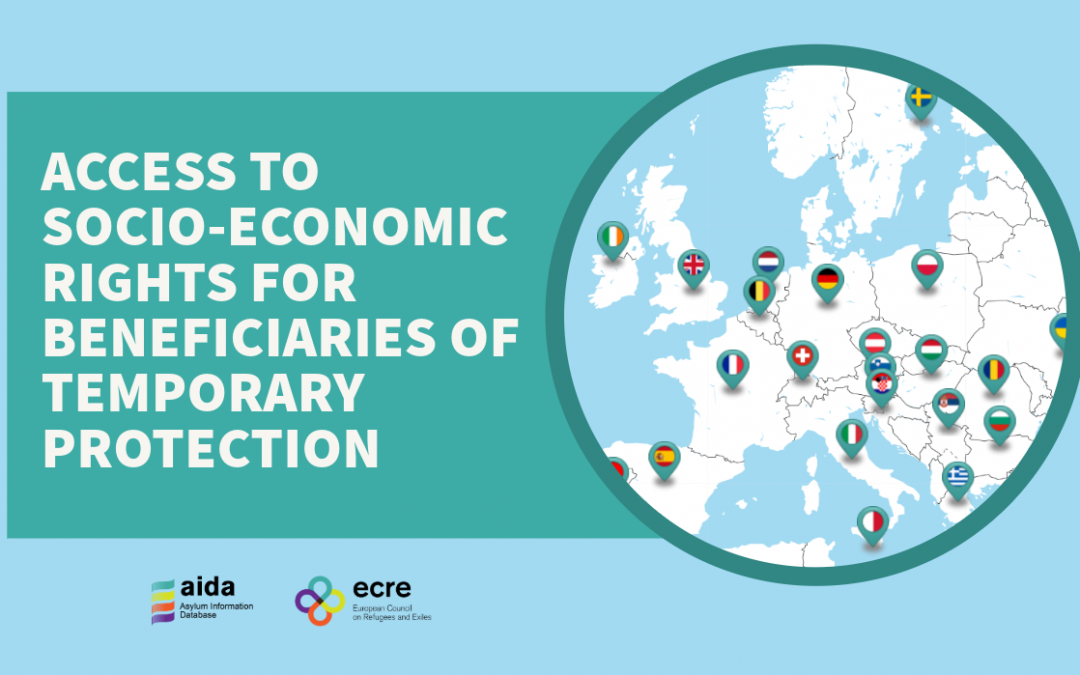22nd January 2025 | News

The latest AIDA comparative report provides an overview of access to socio-economic rights for beneficiaries of temporary protection (TPBs) in Europe. It covers the main trends, challenges and good practices regarding access to socio-economic rights for TPBs in 19 EU member states and three non-EU countries and is an updated version of the first AIDA comparative report on access to socio-economic rights for TPBs which was published in 2023 and which covered the situation during the first year following the activation of the Temporary Protection Directive.
The latest comparative report includes the following key findings:
- Accommodation: The forms of accommodation made accessible to BTPs during the initial stages of the emergency response largely remained available, with continuous financial support and increased occupancy of private housing compared to reception centres. However, divergencies among policies regulating access to accommodation, as well as duration and amount of granted support remained, with certain reception centres and assistance programmes being closed down. In addition, the disproportionate effect of the housing crises on displaced people contributes to a situation of homelessness in certain countries, whereas the matching services, as well as screening and vetting measures remained limited.
- Employment: Access to employment has been significantly facilitated by removing the requirement to obtain an authorisation to work and the provision of vocational training, language courses and career counselling. However, administrative barriers such as the need for recognition of qualifications, language barriers, restriction to access certain occupations and a lack of information on administrative procedures still represent key obstacles. Measures to prevent and combat exploitation continue to be largely missing.
- Education: The integration into the system of education for children was undermined by the challenge of reconciling local programmes with Ukrainian ones since many children still attend Ukrainian schools via online tools. While a number of facilitating measures have been developed to ensure a speedy assessment of children’s levels of education, vulnerabilities and language skills, a range of issues in this area remain, including schools’ limited capacities and the lack of support for Ukrainian children with disabilities. Access to higher education has been supported by waived tuition fees for TP holders and the establishment of ad hoc scholarships.
- Healthcare: Access to healthcare services for BTPs varies significantly across the countries. Although in most cases, people who have been displaced from Ukraine are entitled to full access to public healthcare systems under the same conditions as citizens, some countries limit their access to essential or emergency care only. In addition, access to healthcare is hampered by administrative barriers, lack of information and language mediation, and limited psychological support remains a key issue.
- Social welfare: In the context of the lack of harmonised rules on access to social welfare and varying approaches across the countries, common challenges include administrative barriers and long waiting times for the granting of access, an insufficient amount of benefits, lack of vulnerability assessments before the provision of social assistance, and the suspension of access to social benefits due to back-and-forth trips to Ukraine. In exceptional cases, BTPs continue to be explicitly excluded from the groups that are eligible for social welfare systems.
The report also includes the following recommendations to national authorities:
-
Improve public housing conditions and create more affordable long-term private housing solutions
- Improve public housing conditions in line with EU Asylum Agency guidelines
- Refrain from premature closure of the emergency housing facilities
- Continue financial support for independent private housing to facilitate longer-term inclusion of current TPBs in host societies
- Develop better matching and vetting systems for private housing to tackle the risks of abuse and exploitation given limited safeguards
- Ensure timely extension of TP-based permits, something which directly affects access to all types of housing, and, consequently, access to other interrelated rights
-
Ensure direct access to labour markets and reduce administrative barriers to access to education
- Reduce administrative barriers (e.g. need for recognition of qualifications), abolish the restriction on access to certain sectors (e.g. healthcare, education, etc.) and lift the requirements of high administrative fees for BTPs in both employment and education
- Facilitate access to language courses and counselling
- Disseminate information on relevant administrative procedures
- Introduce long-term programmes to ensure continuity of education despite the short-term nature of TP-related statuses
-
Apply more flexible conditions for access to healthcare beyond emergency assistance
- Ensure healthcare provision beyond emergency care
- Sustain aid in terms of health insurance without time limits
- Enhance translation assistance and increase the capacities of mental healthcare
-
Provide TPBs with full access to social welfare
- Harmonise the standards of social welfare provision
- Lift the administrative barriers and waiting time for being granted access to social welfare
- Ensure a particular focus on the most vulnerable groups
The latest comparative report is available here and the 2023 version and other comparative reports can be found on the AIDA website.

